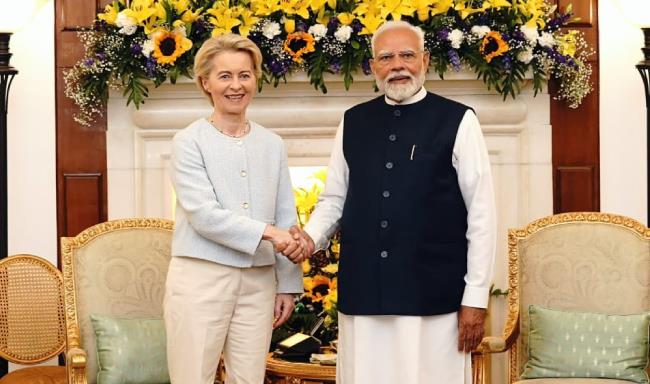Picture Credit: Ministry of External Affairs, GoI
The European Union has announced a new strategic roadmap to elevate its partnership with India, focusing on trade, technology, defence, and global cooperation. The initiative, outlined in a Joint Communication adopted by the European Commission and the High Representative, marks a significant milestone in EU–India relations.
President Von der Leyen: “Taking the relationship to the next level”
European Commission President Ursula von der Leyen, unveiling the plan on Wednesday, said the EU must strengthen ties with reliable partners.
“Now is the time to double down on partnerships rooted in shared interests and guided by common values. With our new EU–India strategy, we are taking our relationship to the next level – advancing trade, investment, and talent mobility, strengthening economic security, accelerating the clean transition, driving innovation, and deepening industrial cooperation in defence,” she said.
President Von der Leyen also reaffirmed that the EU remains committed to concluding a Free Trade Agreement (FTA) with India by the end of 2025.
Five Priority Pillars
The Joint Communication identifies five areas of priority for EU–India cooperation:
- Trade and Investment – finalising FTA negotiations, strengthening supply chains, and boosting economic security under the EU–India Trade and Technology Council (TTC).
- Sustainability and Clean Transition – expanding renewable energy collaboration, green hydrogen initiatives, and green finance.
- Technology and Innovation – deepening cooperation on digital issues, proposing a potential EU–India startup partnership, and inviting India to join the Horizon Europe research programme.
- Security and Defence – enhancing joint work on crisis management, maritime security, cyber defence, and counterterrorism, while advancing negotiations on a Security of Information Agreement.
- Connectivity and Global Issues – promoting corridors such as the India–Middle East–Europe Economic Corridor (IMEC), trilateral cooperation with third countries, and multilateral governance.
India’s Response
Prime Minister Narendra Modi welcomed the announcement, describing it as a reflection of shared priorities. In a phone call with von der Leyen on September 18, he said: “Delighted to know about the ‘New Strategic EU–India Agenda’ adopted today. India is ready to take the relationship to the next level. It is our shared commitment, shared goal, and shared responsibility.”
PM Modi reiterated India’s commitment to finalising the FTA this year and renewed his invitation for the next India–EU Summit to be hosted in India in 2026.
Shared Focus on Global Challenges
Both leaders also discussed wider geopolitical developments, including the conflict in Ukraine. Modi and von der Leyen reaffirmed their commitment to supporting an early and peaceful resolution. Von der Leyen added in a post on X that she had also conveyed birthday wishes to the Indian Prime Minister, while stressing that “together we’ll open a new chapter in our partnership.”
Next Steps
The proposals set out in the Joint Communication will now be taken forward at the Council of the EU, with adoption of Council Conclusions foreseen at the Foreign Affairs Council in October. The agenda also seeks to complement initiatives by EU Member States, while introducing enablers such as enhanced skills mobility, academic exchanges, and the creation of an EU–India Business Forum.
Analysts see the move as a turning point in EU–India ties, aligning both partners in advancing economic growth, clean technology, and a rules-based global order.



